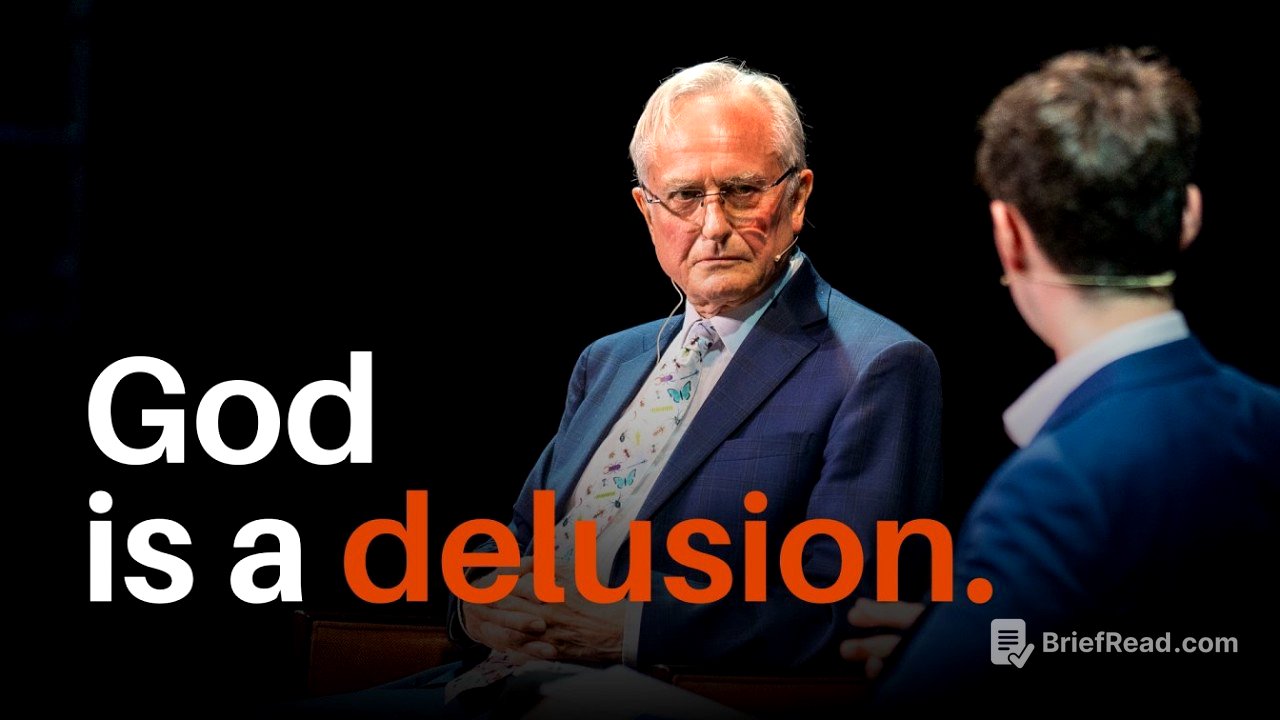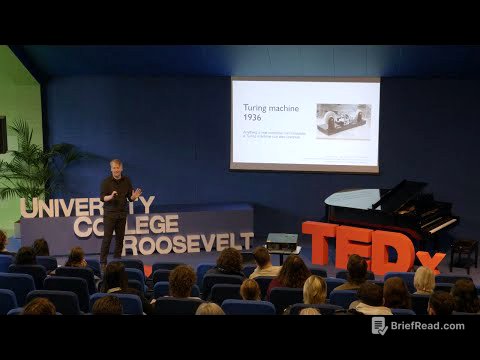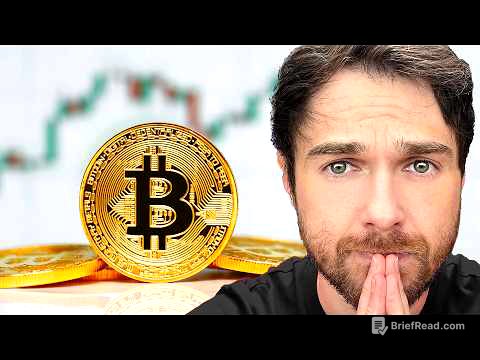TLDR;
Richard Dawkins discusses his book "The Genetic Book of the Dead," touching on themes of evolution, genetics, and the interplay between environment and organisms. He addresses criticisms of his "selfish gene" theory, the concept of "cultural Christianity," and the legacy of the "New Atheism" movement. Dawkins also shares his thoughts on the future of human evolution, the role of artificial intelligence in scientific discovery, and the persistent challenges in understanding consciousness and morality.
- The book "The Genetic Book of the Dead" explores how ancestral environments are imprinted on animals' biology and genetics.
- Dawkins defends the gene-centered view of evolution, emphasizing the gene's potential immortality through informational copies.
- He clarifies his stance on being a "cultural Christian," emphasizing his familiarity with Christian culture due to his upbringing, not an endorsement of its beliefs.
- Dawkins reflects on the "New Atheism" movement, questioning whether it was a deliberate project and assessing its impact on religious belief.
- He discusses the fine-tuning of physical constants in the universe and the multiverse theory as potential explanations.
Internal Language and Thought Processes [0:14]
Before the development of language, thought might have been processed as an internal language, which later externalized into spoken language. Language is uniquely human, featuring hierarchical nesting of phrases that require complex computation. This ability to build up phrases with indefinite embedding, like "if so and so then so and so," suggests a level of computation unique to the human brain. A predecessor to this might be thought processes present in other animals, where they consider the consequences of their actions.
Deconverting the Last Religious Believer [1:47]
Dawkins discusses a scenario where he has the opportunity to deconvert the very last religious believer. He affirms that he would take the opportunity. He contrasts his view with Christopher Hitchens, who felt there was something that "doesn't feel right about it".
Introduction by Alex O'Connor [4:09]
Alex O'Connor introduces Richard Dawkins, highlighting his significant contributions to atheism through "The God Delusion." Dawkins, an evolutionary biologist, has engaged in numerous debates with high-profile figures, and is known for his varied passions. O'Connor mentions Dawkins' concept of cultural Christianity, noting his appreciation for the King James Bible, even song, and church bells, despite his atheism. He also notes Dawkins' hands-on approach to his career, from traveling to evangelical America to designing evolutionary computer simulations and dissecting a giraffe.
The Genetic Book of the Dead and Evolutionary Palimpsests [9:47]
Dawkins introduces his book, "The Genetic Book of the Dead," explaining that animals and their ancestral environments can be read like a book, with animals serving as evolutionary palimpsests. A palimpsest is a manuscript that has been partially or wholly erased and overwritten, reflecting how an animal's current form contains layers of its ancestral past. Camouflaged animals exemplify this, with their resemblance to the background demonstrating the perfection of natural selection. This perfection pervades the entire animal, describing the environments in which its ancestors survived.
Ancestral Imprints and Evolutionary Blunders [12:59]
Animals are more than skin deep, with their chemistry reflecting the chemistry of the past. Human back pain is presented as a genetic memory of walking on all fours. Dawkins also touches on evolutionary blunders, citing the recurrent laryngeal nerve of the giraffe as an example of poor design. This nerve takes a long detour down the neck and back up to the larynx, a historical relic from fish ancestors where the direct pathway was south of the artery. The marginal cost of each increment in the detour was less than the cost of re-routing the entire nerve.
Human Interference and the Gene-Centered View of Evolution [17:32]
Human societies interfere with natural selection by caring for the weakest, which may make it difficult for future historians to read our ancestral environment. Dawkins defends his gene-centered view of evolution, where the gene is the unit of selection because it is potentially immortal through informational copies. He addresses criticisms, such as the view that DNA is merely a library for protein synthesis, arguing that genes have a causal influence on their own survival via embryological processes.
Genes as Symbiotic Viruses [23:05]
Dawkins speculates that genes are like a gigantic colony of symbiotic viruses, distinguishing between longitudinal (vertical) and horizontal parasites. Vertical parasites, which pass through generations via gametes, share the same interests as the host's genes, promoting the host's survival and reproduction. Horizontal parasites, which spread through sideways routes, do not necessarily benefit the host. Dawkins concludes that all our own genes cooperate because they have the same hope for the future, passing to the future in the same vehicles (gametes).
Accelerated Natural Selection and Convergent Evolution [27:16]
Examples of accelerated natural selection include the peppered moths during the industrial revolution and mosquitoes in the London Underground. Convergent evolution demonstrates the power of natural selection, with the marsupial fauna of Australia mirroring mammals in other parts of the world. Marsupial wolves, rabbits, and moles evolved independently to fill similar ecological niches. Tortoises uniquely demonstrate a double doubling back, with ancestors that were fish, then land animals, then turtles in the water, and finally land tortoises again.
Misunderstood Concepts in Evolutionary Biology [34:16]
Common misunderstandings in evolutionary biology include underestimating the amount of time involved and thinking evolution is purely a matter of chance. Dawkins uses the analogy of "Mount Improbable" to explain that complex features like the eye evolve gradually through a series of small improvements, rather than appearing suddenly by chance. He addresses the criticism of irreducible complexity, arguing that it often stems from a lack of imagination. Half a wing is better than a quarter of a wing, aiding in gliding and jumping.
Cultural Christianity and the New Atheism Project [41:05]
Dawkins clarifies his "cultural Christianity," stating it refers to his upbringing in Christian schools and familiarity with Christian culture, not a religious belief. He addresses accusations that the New Atheists created a meaning vacuum, opening the door to "wokery," but says he condemns irrationality wherever he sees it. Dawkins questions whether the New Atheism was ever a deliberate project, as the term was coined by journalists, not the movement's figures.
Jordan Peterson and the Definition of God [47:47]
Dawkins recounts his conversations with Jordan Peterson, noting Peterson's focus on symbolic resonance over factual accuracy. He critiques Peterson's interpretation of the Cain and Abel story and his muddling of fact with symbol. Dawkins defines the kind of God he thinks doesn't exist as an intelligent creator who invented the laws of physics and started the universe. He challenges theologians to define God in a way that is not a creative intelligence.
Deathbed Conversions and Unfavorite Questions [56:37]
Dawkins dismisses the book "The Faith of Christopher Hitchens" as a disgrace, speaking ill of the dead by suggesting Hitchens was flirting with faith near the end of his life. He asserts there is absolutely zero chance of a similar deathbed conversion happening to him. Dawkins expresses his dislike for the "free will" question and the "what advice would you give a young person" question. He advises those seeking to communicate ideas to put themselves in the position of the reader or listener.
Religion, Science, and the Origin of Life [1:01:10]
Dawkins believes that religion and science are incompatible, especially if religion involves belief in a supernatural creator. He suggests that the next big breakthrough in science might be understanding the origin of life, though it may always remain a mystery. He also touches on the theory of everything and the unification of quantum theory and relativity.
Human Evolution, AI, and Genetic Engineering [1:07:50]
Dawkins does not believe human beings are the last stage in evolution. He speculates that artificial intelligence might take over, with the future of humanity lying in silicone. Genetic engineering could dramatically affect human evolution, leading to intelligently designed evolution rather than natural selection. He also considers how cosmetic surgery and caring for the weak might influence mate selection and human evolution.
The Evolution of Intelligence and Consciousness [1:12:22]
Dawkins discusses the major steps in evolution that led to intelligent life, including the origin of life, the eukaryotic cell, multicellular life, and nervous systems. He suggests that the universe may be crawling with bacterial-type life, but advanced life capable of broadcasting radio signals could be very rare. Dawkins finds it hard to deny the possibility of philosophical zombies and struggles to understand the evolutionary purpose of subjective consciousness.
Morality, Suffering, and Artificial Intelligence [1:19:28]
Dawkins argues that moral philosophy is a respectable subject and that you don't need religion for morality. He believes the best we can do is think about designing the sort of society we'd like to live in. He suggests that minimizing the suffering of sentient beings is close to his conscious axiom for morality. Dawkins is impressed by the power of artificial intelligence in scientific discovery, such as solving the protein folding problem.
Challenges and the Fine-Tuning of the Universe [1:26:44]
Dawkins says that nothing keeps him up at night, but the nearest approach would be the fine-tuning point. The physical constants are precisely tuned to certain values, and if any one of those constants was slightly different in value, the universe wouldn't exist. He says that some people think you can derive theism from that, but he thinks you're simply pushing the problem back and wondering where the divine knob twiddler came from.
Deconverting the Last Religious Believer Revisited [1:29:38]
Dawkins reiterates his stance on de-converting the last religious believer, stating he would do it. He contrasts this with the sadness he feels when a language dies or a species goes extinct, which he does not equate to the extinction of a religious idea.








